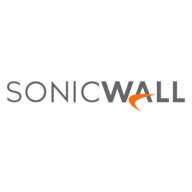


Forcepoint Next Generation Firewall and SonicWall NSa are two widely used firewall solutions. Based on user reviews, Forcepoint's overall performance and advanced threat protection give it an edge over SonicWall NSa. However, SonicWall NSa offers cost-effective solutions with reliable cybersecurity features.
Features: Users find Forcepoint’s real-time threat intelligence and advanced intrusion prevention valuable, praising its ability to handle complex environments seamlessly. Forcepoint also offers strong malware protection and network visibility. SonicWall NSa is noted for its robust protection services, high-speed performance, and deep packet inspection capabilities. Both products offer strong feature sets, but Forcepoint’s advanced threat detection tools stand out compared to SonicWall's solid performance and reliability.
Room for Improvement: Users suggest Forcepoint could enhance its reporting capabilities and simplify its configuration settings. Additionally, they see room for improvement in its user interface. For SonicWall NSa, improvements are needed in its VPN services and firmware stability. Users also indicate that SonicWall could benefit from better customer support documentation. While both products have areas for potential improvement, Forcepoint users mostly focus on software enhancements, whereas SonicWall users are concerned with hardware and firmware reliability.
Ease of Deployment and Customer Service: Forcepoint users appreciate its straightforward installation and integration, along with responsive and knowledgeable support. SonicWall NSa is noted for its relatively easy deployment but receives mixed reviews on customer service quality. Forcepoint edges out slightly in deployment efficiency and superior customer support.
Pricing and ROI: Forcepoint is viewed as more expensive, but users feel the advanced security and support justify the cost. SonicWall NSa offers a more budget-friendly option with satisfactory ROI, although some users believe its lower price impacts overall performance. While Forcepoint is considered costlier, its ROI reflects its comprehensive security features and high user satisfaction.
Clients are now comfortable and not wasting productive hours on IT support.
We have experienced a positive return on investment by utilizing Fortinet's products.
There's definitely an ROI. Having a centralized way of managing and applying policies across the entire organization always helps.
Cybersecurity ROI could be $1 or $100 million, depending on the risk of data behind it.
He explained that it required a command line configuration, as it couldn't be done through the graphical user interface.
I would rate their support for FortiGate a nine out of ten.
They offer very accurate solutions.
Unlike Fortinet where you can escalate an issue and quickly get responses from the development team, Forcepoint's process seems slow and challenging.
Technical support is sometimes slow to respond, and it takes longer to resolve issues.
The support from SonicWall was excellent.
SonicWall support is very helpful and responsive.
They scale up really well from smaller models like the FortiGate 40 and 50 to bigger sites with the FortiGate 100 for more throughput - up to enterprise datacenters.
The variation comes in terms of the interfaces and throughputs, but from a security perspective, you get the same benefit, irrespective of whether you have an entry-level unit or an enterprise.
There are many options available, and we can choose the size of the box based on our requirements.
There are restrictions in the firewall manager and limitations when deploying for cloud environments.
I would rate its scalability around eight out of ten, meaning there are no issues, and it is pretty easy to scale.
There are no bugs or glitches, and it doesn't crash or freeze.
Improper handling of these can lead to a memory surge, a well-known bug that can cause the entire system to freeze.
It is less stable than Palo Alto Networks and Check Point firewalls because there are lots of bugs in the latest firmware.
The stability of SonicWall NSA is quite good.
If I have put 10 GBPS of throughput on a firewall and I enable all of these features available, such as IPS or UTM functionalities, the throughput comes down to 1 GBPS.
By providing an integrated solution, users would have access to all features and functionalities within a single window, eliminating the need to navigate through multiple windows.
Investing in a solution that can accommodate such growth would be more cost-effective than repeatedly purchasing new hardware.
Fast response and efficient handling of issues, similar to how Fortinet responds, would be great.
I recommend that additional features be included in a single license to avoid the need for extra licensing costs.
More details in the analytical tools offered would be appreciated since it is not yet mature.
There are some aspects of the dashboard configuration or customization that could be improved.
Secure SD-WAN is free of charge.
The most expensive part is the renewal of the license subscription.
FortiGate is priced lower than Palo Alto.
The costs can be high since additional features require separate licenses.
In terms of pricing, I would place Forcepoint in the middle when compared to other firewalls like Fortinet and Palo Alto.
SonicWall is much cheaper compared to Fortinet, particularly regarding renewal and licensing costs.
I would rate the price of the product as seven out of ten.
It's easy to monitor the end-to-end network through the firewall.
The firewall, IPS, and VPN functions are the most valuable features.
FortiGate provides solid protection against viruses, malware, and other threats.
With Forcepoint, this process is simplified compared to others like Fortinet.
The most valuable features of Forcepoint Next Generation Firewall are the advanced threat protection, including features like IPS and DDoS prevention, which help avoid internal DDoS attacks.
Real-time deep memory inspection is very helpful and has had a positive impact on our security posture.
SonicWall NSA's most valuable features are its SD-WAN and a system RTBI that blocks all attacks.



Fortinet FortiGate offers comprehensive network security and firewall protection across multiple locations. It effectively manages data traffic and secures environments with features like VPN, intrusion prevention, and UTM controls.
Organizations rely on Fortinet FortiGate for its robust integration with advanced security policies, ensuring significant protection for enterprises, cloud environments, and educational sectors. It facilitates network segmentation, application-level security, and authentication management, securing communication within and between locations such as branches and data centers. Its efficient SD-WAN and UTM features enable streamlined data management and enhanced threat protection capabilities. Users appreciate its centralized management, facilitating seamless operations across diverse environments.
What are the key features of Fortinet FortiGate?
What benefits should users expect from Fortinet FortiGate?
Fortinet FortiGate is crucial in sectors like education, offering robust networks for secure data flow between campuses and facilitating remote learning. In enterprise environments, it allows efficient management of application traffic and security across multiple branches, while in the cloud, it seamlessly integrates with diverse platforms to enhance security infrastructure.
Forcepoint Next Generation Firewall is a versatile and comprehensive solution for perimeter security, offering features such as SD-WAN, IPS, VPN, and cloud or on-premises subscription keys. It is preferred by many clients over Cisco and is used for obligation redundancy, VPN access, and as the main point of security in infrastructure.
The product is praised for its simplicity, flexibility, complete feature set, scalability, and central management capabilities. Other valuable features include IPS, firewall, sandbox, application control, filtering, security management center, connectivity, and integration capabilities.
SonicWall NSa dispenses advanced threat protection using a high-performance security platform. The NSa series implements intuitive deep learning technologies in the SonicWall Capture Cloud Platform to dispatch the automated real-time threat detection and deterrence enterprise organizations need today. SonicWall Network Security appliance (NSa) series is best for mid-sized organizations to distributed enterprises and data centers.
SonicWall NSa series next-generation firewalls (NFGWS) combine two very robust security ideologies to deliver advanced threat protection to keep users’ networks safe. Boosting SonicWall’s multi-engine advanced threat protection (ATP) is their Real-time Deep Memory Inspection (RTDMI™). The RTDMI intuitively identifies and stops aggressive zero-day threats and vicious malware by investigating memory directly. This real-time process allows SonicWall RTDMI to be accurate, lessen false positives and discover and alleviate malicious threats and attacks. SonicWall’s single-pass Reassembly-Free Deep Packet Inspection (RFDPI) will audit every byte of each and every packet by investigating both outbound and inbound traffic on the firewall. By combining the SonicWall Capture Cloud Platform along with on-box offerings such as intrusion prevention, web/URL filtering, and anti-malware, the NSa series is able to block the most malicious and dangerous threats at the gateway.
Additionally, SonicWall firewalls supply absolute protection by executing complete inspection and decryption of SSH and TLS/SSL encryption connections - no matter the port or protocol. The firewall takes a deep dive into each and every packet (the header and data) routing out any anomalies, zero-day intrusions, threats, and protocol non-compliance. Users can also define unique criteria specific to their organization to ensure their networks remain safe. This aggressive deep packet inspection is able to identify and block malicious attacks, stop dangerous malware downloads, prevent the spread of infections, and defeat command and control (C&C) communications and data exfiltration. Protocols involving inclusion and exclusion allow users complete control to decide, based on specific governance policies, organizational policies, or government or legal compliance, which traffic is to be investigated for decryption or inspection.
SonicWall Nsa offers enterprise organizations the network control and fluid flexibility they desire using an intrusion prevention system (IPS), VPN, real-time visualization, and other advanced powerful security features, making it a popular firewall solution in today's marketplace.
Reviews from Real Users
“The features that I have found most valuable are the firewalling, which is very good, and the GUI which is very intuitive. It is easy to use and provides great security.” - Network Engineer at a maritime company
“What's valuable in SonicWall NSa is the ATP (advanced threat protection). It can protect users from malicious links. SonicWall NSa also has a Sandboxing service that is very helpful for us, especially when end users accidentally click on malicious links. Another valuable feature of this solution is that it is very useful for site-to-site VPN connectivity issues. SonicWall NSa has very good hardware. I also love that SonicWall has very good technical support, who are very knowledgeable, provide good suggestions, and they're easy to reach.” - Mohammed M., Network Administrator at Transgulf Readymix
We monitor all Firewalls reviews to prevent fraudulent reviews and keep review quality high. We do not post reviews by company employees or direct competitors. We validate each review for authenticity via cross-reference with LinkedIn, and personal follow-up with the reviewer when necessary.